Amy Nathanson, Molly Sharp, Fashina Aladé, Eric Rasmussen, and Katheryn Christy, all from Ohio State University, published the first research that ties too much television in early childhood with a delayed or defective development of theory of mind.
Theory of mind is the name for the developmental processes by which children and adults become conscious of and sensitive to the feelings, mental states, and emotions of other people. Theory of mind also represents the ability to acknowledge that other people have beliefs differing from a person’s individual beliefs and the development of the understanding that other people act on their beliefs.
The researchers tested 107 preschool aged children and interviewed their parents to determine the relationship between the development of theory of mind and television exposure. Television exposure was determined by whether the child had a television in their room and the amount of background television the child was exposed to during other activities.
Children that were exposed to more television demonstrated a slower development of theory of mind. Those children who discussed television with their parents displayed a more rapid development of theory of mind that was still less rapid than children that watched less television.
This is the first study that hints at the possibility that television exposure may be related to antisocial behaviors due to a slow development of theory of mind. The content of the television program is not the issue but the time that a preschool aged child is exposed to television is the issue.















